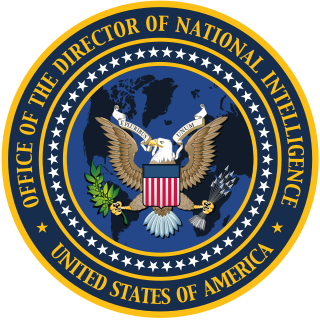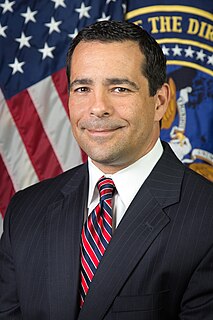
The Federal Security Service of the Russian Federation is the principal security agency of Russia and the main successor agency to the USSR's Committee for State Security (KGB). Its main responsibilities are within the country and include counter-intelligence, internal and border security, counter-terrorism, and surveillance as well as investigating some other types of grave crimes and federal law violations. It is headquartered in Lubyanka Square, Moscow's centre, in the main building of the former KGB. According to the 1995 Federal Law "On the Federal Security Service", direction of the FSB is executed by the president of Russia, who appoints the Director of FSB.

The Director of Central Intelligence (DCI) was the head of the American Central Intelligence Agency from 1946 to 2005, acting as the principal intelligence advisor to the President of the United States and the United States National Security Council, as well as the coordinator of intelligence activities among and between the various U.S. intelligence agencies.

The United States Director of National Intelligence (DNI) is the United States government Cabinet-level official—subject to the authority, direction, and control of the president of the United States—required by the Intelligence Reform and Terrorism Prevention Act of 2004 to:

The Foreign Intelligence Service of the Russian Federation or SVR RF is Russia's external intelligence agency, focusing mainly on civilian affairs. The SVR RF succeeded the First Chief Directorate (PGU) of the KGB in December 1991. The SVR has its headquarters in the Yasenevo District of Moscow.

The United States Naval Criminal Investigative Service (NCIS) is the primary law enforcement agency of the U.S. Department of the Navy. Its primary function is to investigate criminal activities involving the U.S. Navy and U.S. Marine Corps, though its broad mandate includes national security, counterintelligence, counter-terrorism, cyber warfare, and the protection of U.S. naval assets worldwide. NCIS is the successor organization to the former Naval Investigative Service (NIS), which was established by the Office of Naval Intelligence after the Second World War.

Stephen R. Kappes was the Deputy Director of the Central Intelligence Agency (DDCIA), until his resignation on April 14, 2010. He had served in the CIA since 1981, with a two-year hiatus. A career clandestine operations professional, Kappes supervised the extraordinary rendition program, a non-judicial system of rendering persons suspected of terrorism to secret locations where most of them were interrogated. Kappes also helped persuade Libyan leader Muammar al-Gaddafi to abandon his nuclear weapons program in 2003. In 2009, Kappes was convicted in absentia by an Italian court for his headquarters-based role in the rendition and torture of an Egyptian citizen who was kidnapped from Italian soil by the CIA.
The Directorate of Operations (DO), less formally called the Clandestine Service, is one of the smallest components of the US Central Intelligence Agency. It was known as the Directorate of Plans from 1951 to 1973; as the Directorate of Operations from 1973 to 2005; and as the National Clandestine Service (NCS) from 2005 to 2015.

The Directorate General of Forces Intelligence, commonly known as DGFI is the military intelligence section of the Bangladesh Armed Forces, tasked with collection, collation, and evaluation of strategic and topographic information, primarily through human intelligence (HUMINT). As one of the principal members of the Bangladeshi intelligence community, the DGFI reports to the Director-General and is primarily focused on providing intelligence for the Prime Minister, the Cabinet of Bangladesh, and the Armed Forces of Bangladesh.

The National Intelligence Coordinating Agency (NICA) is the primary intelligence gathering and analysis arm of the Philippine government, in charge of carrying out overt, covert, and clandestine intelligence programs. The NICA cooperates with friendly countries and government agencies in and out of the country by posting agents as liaison officers.

The Under Secretary of Defense for Intelligence or USD(I) is a high-ranking civilian position in the Office of the Secretary of Defense (OSD) within the U.S. Department of Defense that acts as the principal civilian advisor and deputy to the Secretary and Deputy Secretary of Defense on matters relating to military intelligence. The Under Secretary is appointed from civilian life by the President and confirmed by the Senate to serve at the pleasure of the President.
The DCI Exceptional Collector National HUMINT Award is a decoration awarded annually by the U.S. Director of Central Intelligence to recognize individuals and groups for improved Human Intelligence (HUMINT) collection and reporting of information that is of significant value to the U.S. intelligence community.

The National Counterintelligence and Security Center (NCSC) leads national counterintelligence (CI) for the United States government. It is part of the Office of the Director of National Intelligence (ODNI). The director of the center also serves as the National Counterintelligence Executive.
The Agence Nationale de Renseignements (ANR) is a government intelligence agency of the Democratic Republic of the Congo. The role of the agency is to ensure "internal security and external security" of the state. The agency was strongly criticized for the disrespect of human rights by several organisations. Inzun Kakiak has led the agency since 2019.

Judith A. "Jami" Miscik rose from the analytic ranks of the Central Intelligence Agency to become Deputy Director for Intelligence, the Agency's senior most analytic post. In 2005 she left CIA to become Global Head of Sovereign Risk for the now-bankrupt financial services firm Lehman Brothers. Miscik is currently President and Vice-Chairman of Kissinger Associates, Inc. in New York. On December 23, 2009, Ms. Miscik was appointed to President Obama's Intelligence Advisory Board.

The CIA publishes organizational charts of its agency. Here are a few examples.

Francis Xavier "Frank" Taylor was the Under Secretary of Homeland Security for Intelligence and Analysis at the U.S. Department of Homeland Security (DHS), nominated by President Obama in 2014. In that role, he provided the Secretary, DHS senior leadership, the DHS components, and state, local, tribal and private sector partners with homeland security intelligence and information they need to keep the country safe, secure and resilient. DHS Office of Intelligence and Analysis is a member of, and the Department’s liaison to, the U.S. Intelligence Community.

The Counterintelligence Division (CD) is a division of the National Security Branch of the Federal Bureau of Investigation. The division protects the United States against foreign intelligence operations and espionage. It accomplishes its mission of hunting spies and preventing espionage through the use of investigation and interaction with local law enforcement and other members of the United States Intelligence Community. In the wake of the September 11, 2001 attacks, the division's funding and manpower have significantly increased.

William R. Evanina is an American law enforcement official who is currently the NCIX, which is the executive officer of the United States Office of the National Counterintelligence Executive (ONCIX), and who is also the director of the National Counterintelligence and Security Center. As NCIX he is the head of national counterintelligence for the U.S. Government. Prior to his appointment to ONCIX, he was the chief of the Counterespionage Group for the Central Intelligence Agency (CIA). He gained his initial law enforcement as an agent for the Federal Bureau of Investigation (FBI).

Gina Cheri Haspel is an American intelligence officer serving as Director of the Central Intelligence Agency (CIA) since 2018. She is the first woman to hold the post on a permanent basis and was previously the Deputy Director under Mike Pompeo during the early presidency of Donald Trump.
Mark E. Kelton is a former senior executive of the Central Intelligence Agency, concluding his career with the position of Deputy Director of the National Clandestine Service for Counterintelligence (DDNCS/CI). He is currently an adjunct assistant professor at Georgetown University, and Director of Threat Insider Solutions at Cipher Systems, LLC.




















